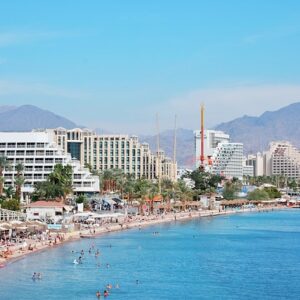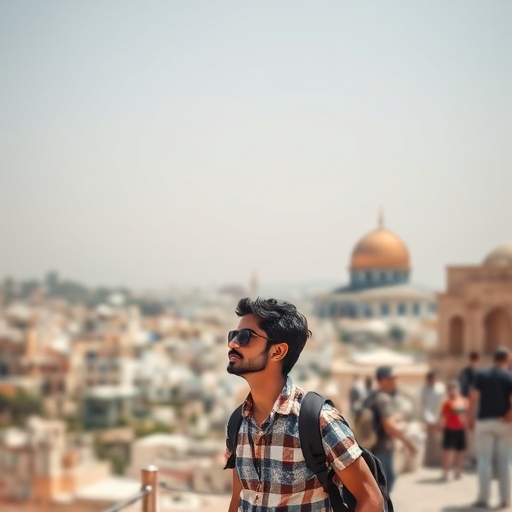"My trip to Israel was absolutely unforgettable! The history and culture in Jerusalem left me speechless – standing at the Western Wall and walking through the Church of the Holy Sepulchre was an emotional experience. The Dead Sea was something I’ll never forget – floating in the salty waters was surreal. The people in Israel are incredibly friendly, and the food, especially the hummus and falafel, was delicious. I recommend Israel to anyone who is passionate about history, culture, and adventure!"
- Home
- About Us
- International
- Africa
- America
- Asia
- Australia & New Zealand
- Europe
- Middle East
AfricaEgypt
Mauritius
Zimbabve
AmericaAsiaAustralia & New ZealandEuropeCentral and Eastern Europe
Highlights
Mediterranean Europe
Middle East - Domestic
- North India
- South India
- East and North East
- Rajasthan, West and Central
North IndiaDelhi
Himachal Pradesh
Uttarakhand
Amritsar
Chandigarh
Punjab & Haryana
Uttar Pradesh
South IndiaAndaman and Nicobar Islands
Kerela
Andhra Pradesh
Tamil Nadu
East and North EastAssam
Nagaland
Tripura
Meghalaya
Rajasthan, West and Central - Temple Darshan
- Group Booking
- Blogs
- Contact Us
Sights

Explore Israel
The Chardham Yatra is one of the most important pilgrimage journeys in India, dedicated to the worship of Hindu deities. It involves visiting four sacred shrines located in the Indian state of Uttarakhand, in the Himalayan region. The Chardham Yatra is considered a spiritual journey, and it is believed that visiting these four temples can bring salvation and remove the cycle of birth and death (moksha).
Places You'll See





Tour Highlights
- Well planned Tour itinerary.
- Kitchen as per our own convenience.
- Best hotels through out the tour.
- Unique tour of Scenic Beauty
- Stay in destinations that have proper facilities like hospitals, Market.
- Our groups are scheduled back to back, which is very helpful.
Tour Itinerary
Israel
Days Plan
- Arrival: Arrive at Ben Gurion International Airport (Tel Aviv). Transfer to your hotel and check in.
- Morning: Rest and refresh after your flight.
- Afternoon: Explore Tel Aviv, Israel’s vibrant coastal city.
- Visit Jaffa, an ancient port city with cobbled streets and historic buildings.
- Explore the Neve Tzedek neighborhood, known for its charming streets, boutiques, and art galleries.
- Relax at Tel Aviv’s beaches along the Mediterranean Sea.
- Evening: Enjoy dinner at a seaside restaurant and experience the nightlife of Tel Aviv.
- Morning: After breakfast, head to Jerusalem (about a 1-hour drive).
- Afternoon: Explore the Old City of Jerusalem, a UNESCO World Heritage Site:
- Visit the Western Wall (Wailing Wall), one of the holiest sites in Judaism.
- Explore the Church of the Holy Sepulchre, believed to be the site of Jesus' crucifixion and resurrection.
- Walk along the Via Dolorosa, the path Jesus took to his crucifixion.
- Visit the Dome of the Rock and Al-Aqsa Mosque on the Temple Mount.
- Evening: Enjoy dinner in Jerusalem, and experience the city’s unique blend of ancient history and modern culture.
- Morning: Head to the Dead Sea (around 1.5 hours from Jerusalem).
- Visit Masada, a UNESCO World Heritage Site. Take a cable car to the top of this ancient fortress for stunning views of the desert and the Dead Sea.
- Explore the archaeological site of Masada, including the ancient Roman palace, synagogue, and fortifications.
- Afternoon: After visiting Masada, head down to the Dead Sea for a unique experience:
- Float in the salty waters of the Dead Sea and enjoy the therapeutic mud.
- Evening: Return to Jerusalem for the night.
- Morning: Early departure to Nazareth (about 2 hours from Jerusalem).
- Visit the Basilica of the Annunciation, one of the most important Christian sites in the world.
- Explore the St. Joseph Church and Nazareth Village, an open-air museum that recreates life in the time of Jesus.
- Afternoon: Travel to the Sea of Galilee region (about 1 hour from Nazareth):
- Visit the Mount of Beatitudes, where Jesus delivered the Sermon on the Mount.
- Explore Capernaum, an ancient fishing village where Jesus performed many miracles.
- Take a boat ride on the Sea of Galilee for a peaceful experience.
- Evening: Check in at a hotel near the Sea of Galilee for a relaxing evening.
- Morning: Visit Tiberias, a city on the western shore of the Sea of Galilee, and explore its beautiful beaches and historical sites.
- Afternoon: Depart for Tel Aviv (about a 2-hour drive from the Sea of Galilee).
- Visit the Eretz Israel Museum or the Yitzhak Rabin Center to learn more about Israeli history and culture.
- Stroll along Rothschild Boulevard and see the iconic Bauhaus architecture.
- Evening: Enjoy a farewell dinner at one of Tel Aviv’s famous restaurants, and relax at the beach or enjoy the nightlife.
Notes:
• 2 passport size photos
• Adult – Original + photocopy of any of the ID proof i.e. Aadhar Card / Driving Licence / Voters ID / Passport
• Child – Original + photocopy of any of the ID proof i.e. Aadhar Card / School ID / Passport
• Infant – Aadhar Card / Birth certificate
• NRI / Foreign nationals – Mandatory Passport + Valid Indian visa / OCI card / PIO card
• Above mentioned ID proof is mandatory at the time of booking and carry the same ID proof on tour as well
Israel
Tour Details
Hear from Our
Happy Travelers

"Israel is a country with so much to offer – from the ancient sites in Jerusalem to the natural wonders of the Dead Sea. One of my favorite experiences was the Masada sunrise hike. Watching the sun rise over the desert was an unforgettable moment. I also loved exploring Nazareth and Capernaum around the Sea of Galilee. The people were very welcoming, and I felt safe throughout the trip. Israel is a must-visit for anyone interested in history, nature, and spirituality."

"Israel is a perfect blend of history, adventure, and modernity. I visited both Jerusalem and Tel Aviv, and each city had something unique to offer. Jerusalem’s Old City was like stepping back in time, with the Western Wall and Al-Aqsa Mosque being incredibly moving experiences. The Dead Sea was another highlight – I had a great time floating and using the mineral-rich mud. The food was a treat, and I especially enjoyed the Shakshuka and Knafeh. I would definitely recommend visiting Israel!"

The best time to visit Israel is during the spring (March to May) and autumn (September to November) months. Here’s why:
1. Spring (March to May)
- Weather: Spring in Israel offers mild, pleasant temperatures, typically ranging from 15°C to 25°C (59°F to 77°F). This makes it ideal for sightseeing and outdoor activities.
- Scenery: The countryside blooms with wildflowers and greenery, creating a beautiful landscape, especially around places like the Sea of Galilee, Jerusalem, and the Negev Desert.
- Why Visit: Spring is perfect for exploring historical and religious sites such as Jerusalem, Masada, and Nazareth, as well as enjoying hikes, desert tours, and boat rides on the Sea of Galilee.
2. Autumn (September to November)
- Weather: Autumn also offers pleasant weather, with temperatures averaging between 18°C and 28°C (64°F to 82°F). The days are warm, and evenings are cool, making it comfortable for travel and exploration.
- Cultural Events: Autumn is a popular time for Jewish holidays like Rosh Hashanah and Yom Kippur, which can provide a unique cultural experience for visitors, especially in Jerusalem.
- Why Visit: The cooler temperatures and fewer crowds make autumn an excellent time for outdoor exploration, visiting the Dead Sea, and enjoying the coastal areas like Tel Aviv and Haifa.
3. Winter (December to February)
- Weather: Winter temperatures in Israel can be chilly, especially in Jerusalem and the Golan Heights, with temperatures ranging from 5°C to 15°C (41°F to 59°F). Coastal areas like Tel Aviv have milder winters.
- Why Visit: While winter isn’t ideal for beach activities, it’s still a great time to explore the historical and religious sites without the summer crowds. Additionally, Jerusalem may occasionally see snow, which adds a magical touch to the city’s ancient sites.
4. Summer (June to August)
- Weather: Summer in Israel can be extremely hot, particularly in Eilat and the Dead Sea, where temperatures can soar above 40°C (104°F). Coastal cities like Tel Aviv experience more moderate temperatures but can still be quite warm.
- Why Visit: If you love beach vacations, Tel Aviv’s beaches and Eilat’s Red Sea resorts are ideal during the summer months. It’s also a great time to explore the Dead Sea, where you can float in its therapeutic waters to escape the heat.
- Why Not Visit: If you want to explore historical sites or the desert areas like Masada and Wadi Rum, the intense heat in summer can make it uncomfortable for outdoor activities.
Visiting Israel is a relatively straightforward process for travelers from most countries, including India. Here’s a step-by-step guide on how to plan and visit Israel:
1. Passport and Visa Requirements
- Passport: Ensure that your passport is valid for at least 6 months from your planned date of entry into Israel.
- Visa:
- Indian Citizens: Indian passport holders require a tourist visa to visit Israel. You can apply for a tourist visa through the Israeli Embassy or Consulate in India.
- Visa on Arrival: Indian nationals are not eligible for a visa on arrival in Israel, so you must apply for a visa before your trip.
- Documents Needed: You’ll need to submit documents like:
- A valid passport
- A completed visa application form
- Passport-sized photographs
- Flight booking and hotel reservations
- Proof of sufficient funds for the trip
- Travel insurance
- Possibly an invitation letter (if staying with friends or family)
- Processing Time: Visa processing can take anywhere from 7 to 10 business days, so plan in advance.
- Other Countries: Citizens from some countries, such as the US, EU, and Canada, can apply for an e-visa or visa on arrival. It’s best to check with the Israeli consulate or embassy in your region.
- Indian Citizens: Indian passport holders require a tourist visa to visit Israel. You can apply for a tourist visa through the Israeli Embassy or Consulate in India.
2. Flights to Israel
- Major Airport: The main international gateway into Israel is Ben Gurion International Airport (TLV), located near Tel Aviv.
- Flight Duration: Flights from India to Israel typically take around 7 to 8 hours (direct flights). If you have a layover, the journey may take longer.
- Airlines: Direct flights to Israel are available from cities like Delhi and Mumbai. Airlines such as Air India, El Al Israel Airlines, and Turkish Airlines operate flights with layovers in cities like Istanbul or Dubai.
- Direct Flights: Air India offers direct flights from Delhi to Tel Aviv, making it easier for Indian travelers.
3. Currency and Payment
- Currency: The local currency in Israel is the Israeli New Shekel (ILS).
- ATMs: ATMs are available at the airport, hotels, and in major cities. Credit cards (Visa, MasterCard) are widely accepted in Israel, especially in urban areas.
- Currency Exchange: You can exchange currency at the airport, banks, or currency exchange offices in cities.
- Tip: Always carry some cash for smaller purchases, especially in markets or more remote areas.
4. Getting Around Israel
- Public Transport:
- Buses: Israel has an extensive bus network connecting cities and towns. It’s affordable and efficient for intercity travel.
- Trains: The Israel Railways operates a network of trains connecting major cities like Tel Aviv, Jerusalem, and Haifa.
- Taxis: Taxis are widely available in cities. It’s advisable to use taxi apps like Gett or Uber in Tel Aviv and other areas.
- Car Rentals: Renting a car is popular for traveling at your own pace, especially if you plan to visit sites in more remote areas or the Dead Sea.
- Travel Passes: If you’re using public transport frequently, you can consider getting a Rav-Kav card, which offers discounts on buses, trains, and light rail.
5. Language
- Official Language: Hebrew is the official language of Israel. Arabic is also an official language in some areas.
- English: English is widely spoken, especially in tourist areas, hotels, and restaurants, so communication is generally not a barrier for English-speaking tourists.
6. Health and Safety
- Health Insurance: It is advisable to have travel insurance that covers health, accidents, and medical emergencies. Israel has excellent healthcare facilities, but it’s important to be prepared for any unforeseen medical expenses.
- Vaccinations: No specific vaccinations are required for travelers to Israel. However, routine vaccinations like Hepatitis A and B and Typhoid are recommended.
- Safety: Israel is generally safe for tourists, with robust security measures in place at airports, hotels, and tourist sites. Always stay informed about the security situation and follow local guidelines.
7. Best Time to Visit Israel
- The best time to visit Israel is during the spring (March to May) and autumn (September to November) months, when the weather is mild and pleasant.
- Winter (December to February): Can be cold, especially in Jerusalem and the Golan Heights. However, it’s a good time to explore indoor attractions like museums.
- Summer (June to August): Can be very hot, especially in desert areas and inland cities. Coastal cities like Tel Aviv are more bearable during summer.
8. Cultural Etiquette and Local Customs
- Dress Modestly: While Israel is quite modern, it’s respectful to dress modestly, especially when visiting religious sites like the Western Wall or Church of the Holy Sepulchre.
- Public Behavior: Respect for religious sites and customs is important, particularly in places of worship. Follow local guidelines about photography and behavior.
- Tipping: Tipping is customary in Israel. In restaurants, a tip of 10-15% is common, while hotel staff and taxi drivers usually receive small tips for their services.
9. Top Tourist Attractions in Israel
- Jerusalem: Visit the Old City, including the Western Wall, Church of the Holy Sepulchre, and Dome of the Rock.
- Tel Aviv: Explore the vibrant city known for its beaches, nightlife, and museums like the Eretz Israel Museum.
- Dead Sea: Float in the mineral-rich waters and experience the therapeutic mud.
- Masada: Visit the ancient fortress on a mountaintop for history and stunning views.
- Sea of Galilee: Explore Capernaum and Nazareth, important Christian pilgrimage sites.
- Haifa: Known for the Bahá’í Gardens and beautiful coastal views.
10. Local Cuisine to Try
- Falafel: Deep-fried chickpea balls, often served in pita bread with vegetables and tahini.
- Hummus: A creamy dip made from chickpeas, tahini, olive oil, and lemon.
- Shakshuka: A delicious dish of eggs poached in a tomato and pepper sauce.
- Sabich: A popular street food sandwich with eggplant, hard-boiled eggs, hummus, and tahini in pita bread.
- Knafeh: A sweet dessert made from semolina dough, cheese, and sugar syrup.

Book Now and embark on your next unforgettable adventure
With our team of seasoned travel experts and local guides, we ensure that each trip is crafted to perfection, tailored to your preferences, and filled with unforgettable memories.



